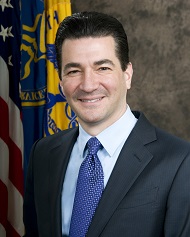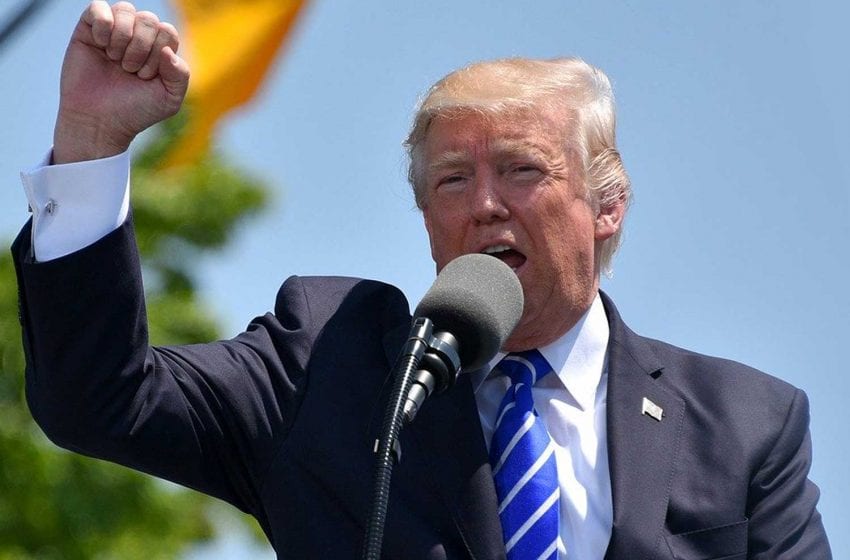The FDA commissioner’s surprise departure is unlikely to provide much relief to the beleaguered tobacco and vapor industries.
By Patrick Basham

It will never be on a par with 9/11, Neil Armstrong’s moonwalk or JFK’s assassination, but within tobacco and vaping circles the question lately was, “Where were you when Gottlieb resigned?”
I was in London evangelizing to a Women in Tobacco event about bitcoin’s role in female empowerment. At one point during my talk, an otherwise attentive audience suddenly became fixated on their smartphones. Seeking to ease my discomfort, a compassionate lady exclaimed, “We’ve all just seen Gottlieb quit!”
My performance anxiety was fleeting, but the tobacco and vapor industries’ collective anxiety is enduring, and with good reason. Despite U.S. Food and Drug Administration (FDA) Commissioner Scott Gottlieb’s surprise resignation, the dark regulatory skies overshadowing the marketplace are unlikely to brighten.
An FDA deputy commissioner under former President George W. Bush, Gottlieb took office as an experienced Washington hand familiar with the FDA’s scientific and regulatory infrastructure; he was comfortable navigating the political minefield that is federal policymaking.
In May 2017, Commissioner Gottlieb began by telling manufacturers he wanted to reduce the harm of combustible cigarettes and bring to market e-cigarettes and other reduced-harm products. He appreciated that, for harm reduction to be successful, adult smokers need access to smoke-free products that deliver nicotine but with significantly lower levels of toxicants than cigarettes. That summer, Gottlieb allowed e-cigarette companies to keep their vapor devices and nicotine pods on the market for an extra four years before they had to prove their products benefit public health.
Yet, he spent the next 20 months cracking down on cigarette companies and aggressively attempting to arrest vaping’s growing popularity. As a top-down, command-and-control regulator swimming against a deregulatory tide, Gottlieb was an outlier in the Trump administration’s senior ranks.
In that vein, he asserted that teen vaping is an “epidemic.” In modern political parlance, “epidemic” is employed to suggest, with only the merest hint of statistical support, that something must be done to reduce consumption of product “X” or to solve alleged public health problem “Y.” In this case, the vapor marketplace became subject to draconian controls to prevent adolescents from gaining access to these relatively harmless products.
Professor of medicine Brad Rodu questions the magnitude of teen vaping. He writes: “The [U.S.] Centers for Disease Control and Prevention’s [CDC] 2017 National Youth Tobacco Survey shows that only about 12 percent of American high school students used e-cigarettes in the past month. Even if the CDC’s observation … is correct about a vaping increase in 2018, it doesn’t confirm an epidemic. Nearly 70 percent of the students who vape—but do not smoke—used e-cigarettes five days or less during that 30-day period, a pattern called ‘party’ or ‘weekend’ vaping, not regular, daily consumption.”
Nonetheless, Gottlieb’s FDA announced significant restrictions, which have yet to take effect, on the retail sale of flavored e-cigarettes. Consequently, Juul Labs, with 73 percent of domestic store-based e-cigarette sales, and other manufacturers of vapor products halted sales of some flavored e-cigarettes in brick-and-mortar retail outlets.
Convenience stores and gas stations will be effectively prohibited by the FDA from selling most flavored e-cigarettes. First proposed in November 2018, these measures will be introduced by this summer and are aimed at limiting access to the flavors most popular among adolescents. Only tobacco-, mint- and menthol-flavored e-cigarettes will be available for sale in these locations.
In another fillip to the illicit market, the FDA is prohibiting bulk online purchases of flavored vapor products. Furthermore, Gottlieb threatened to remove vapor products from the market entirely should the adolescent vaping “epidemic” not abate.
The crackdown on the retail market flies in the face of the fact that only a small minority of young vapers purchase e-cigarettes from brick-and-mortar locations; 86 percent purchase their e-cigarettes online or receive them from a friend or relative. The FDA’s own survey data, “The Population Assessment of Tobacco and Health Survey,” finds that less than 10 percent of teen e-cigarette users “bought them myself.”
Last November, the FDA also announced plans to ban menthol cigarettes, which constitute 35 percent to 40 percent of the U.S. market. Several years ago, the pro-regulation Obama administration consciously avoided this policy, as menthol cigarettes are disproportionately consumed by African Americans, the Democratic party’s most reliable voting bloc. Unconstrained by such electoral concerns, Gottlieb moved forward with this deeply misguided policy that would immediately create a thriving illicit trade in unregulated menthol cigarettes.
Gottlieb also threatened to limit the nicotine in cigarettes to nonaddictive levels, although the FDA arguably lacks the legal authority to do so. At Gottlieb’s urging, President Donald Trump’s latest budget proposal seeks to add a user fee to e-cigarettes to fund the enforcements of limits on flavored e-cigarettes. It is both revealing and dismaying that currently there are more pending legislative bills in Congress aimed at taxing e-cigarettes than increasing cigarette taxes.
Irresponsible
The most recent harm reduction research confirms Gottlieb’s irresponsibility in sacrificing the health of tens of millions of adult smokers at the altar of a fabricated youth epidemic. Professor John Newton of Public Health England has noted how clinical scientific experiments clearly indicate the stark contrast between the impacts of smoking combustible cigarettes and vaping. Globally, most public health experts consider vaping to be 95 percent safer than smoking.
A new study published in the New England Journal of Medicine finds people are almost twice as likely to succeed in quitting smoking if they use e-cigarettes than if they rely on licensed quitting aids, such as nicotine-replacement patches and gums. A revealing Juul Labs study found that smokers who used its popular USB drive-shaped vaporizer product over a five-day period experienced a nearly identical drop in biomarkers related to cancer compared to smokers who abstained from smoking during that period.
Philip Morris International’s new landmark study on e-cigarettes, conducted in collaboration with Altria Group, demonstrates that after six months, e-cigarette vapors with and without nicotine induce significantly lower biological responses associated with cardiovascular and pulmonary diseases than cigarette smoke.
Gottlieb also appears unaware of the law of unintended consequences. Government restrictions on e-cigarettes inadvertently increase combustible cigarette use among teens. A 2015 Yale University study found state-level bans on the sale of e-cigarettes to minors created a statistically significant increase in recent cigarette smoking rates among those aged 12 to 17.
What’s next?
Gottlieb denies he lost favor with the White House, insisting he resigned for personal reasons, namely the strain of commuting to Washington away from his Connecticut home and his wife and three young children. However, White House contacts tell me that several months ago they began to ask, “What has happened to Scott?” They pondered how, in a matter of mere months, their pro-vaping appointee became the nanny state’s poster boy?
They deduced that Gottlieb had suffered the same fate as many well-intentioned political appointees sitting atop departments and agencies throughout Washington, D.C. He was figuratively captured by the permanent institutional interests that dominate policy administration within government bureaucracies. Rather than open the FDA’s eyes on reduced-risk products, he morphed into a spokesman for the FDA’s blinkered statist outlook. A Trump advisor observes that Gottlieb “was swallowed by ‘the swamp.’”
What will happen to Gottlieb’s agenda? According to The Wall Street Journal, “Tobacco companies may have gotten a reprieve” as Gottlieb’s “departure calls into question some of the tough-on-tobacco proposals he championed.” While the affected industries hope a new commissioner will move the FDA in a more enlightened direction, they should not expect that outcome.
When asked if the vaping crackdown would continue after he leaves, Gottlieb said, “I’m very confident of that.” His confidence is well-founded. The FDA operates under the parental umbrella of the Department of Health and Human Services (HHS). HHS secretary Alex Azar was a strong supporter of Gottlieb’s draconian approach. Revealingly, Azar told a recent congressional hearing, “We are going to be carrying forward Dr. Gottlieb’s vision. His agenda is my agenda. My agenda is his agenda.”
At that same hearing, Azar named Norman Sharpless as acting FDA commissioner. A medical doctor and scientist with a respected academic track record, Sharpless is director of the National Cancer Institute, which falls under the purview of the National Institutes of Health. A close Gottlieb ally, and Gottlieb’s preferred successor, he shares Gottlieb’s diktat-driven approach to combating youth vaping.
As the administration settles upon Gottlieb’s replacement, Sharpless is in pole position. Yet, his transition from acting to permanent commissioner is not guaranteed. Another strong contender is Brett Giroir, who currently serves as assistant secretary at the HHS. He is Azar’s choice to succeed Gottlieb, having impressed as Azar’s senior adviser on the HHS’ anti-opioid campaign.
The forthcoming leadership change is likely to be a missed opportunity to reconsider the FDA’s fiat-based approach to e-cigarettes especially. If either Sharpless or Giroir are appointed, the FDA will keep its regulatory feet planted firmly on the necks of tobacco and vapor companies.
There is no reason for these companies to expect the regulatory environment to measurably improve. At best, legislative stasis on Capitol Hill, in tandem with the ebb and flow of the presidential and congressional campaigns, may slow the FDA’s regulatory momentum.
Patrick Basham directs the Democracy Institute (www.democracyinstitute.org) and authored the book, Butt Out! How Philip Morris Burned Ted Kennedy, the FDA & the Anti-tobacco Movement.











